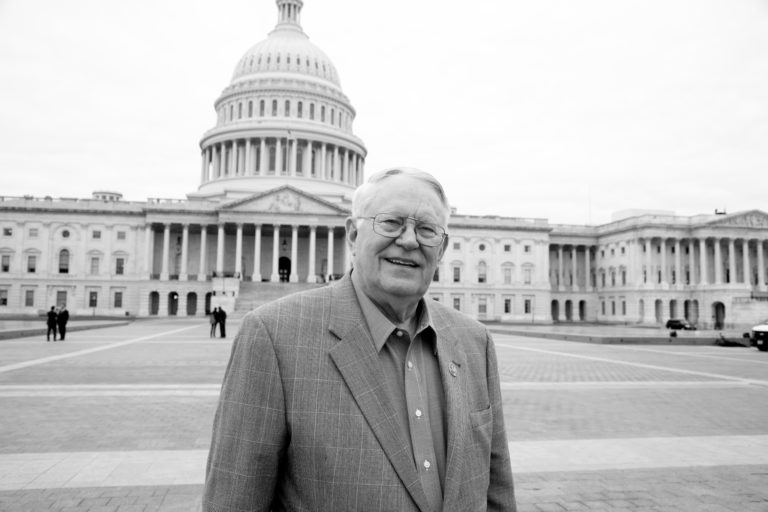By Katie Ellington, Contributing Writer
At the back-right corner of Kinlaw Library, the space formerly known as the media center has recently been renovated into a meeting space and replica office for the new Joe Pitts Center for Public Affairs.
The new replica office, designed to look like Former Congressman Joe Pitts’ office on Capitol Hill, is part of this new Joe Pitts Center for Public Affairs, a $260,000 initiative program to boost Asbury’s political science department, as well as campus’ civic engagement.
The Center is named for Joe Pitts, a graduate of Asbury’s Pioneer Class of 1961. Pitts served in the Pennsylvania State Legislature for 24 years. Afterward, he was elected as U.S. Representative for the 16th Congressional District of Pennsylvania, a position he held from 1997 to 2017.
Pitts has been working with Asbury to develop the Center since last spring. He is a firm believer that Christ-like youth can be the driving force behind change in the United States, and his goal is that the Center will serve to inspire Asbury students to take active roles in their communities.
“I really believe that involvement in the education of our young people is one of the keys of turning our culture,” Pitts said. “Acquainting them with the impact of public policy on their lives and their families’ lives and helping them understand how their engagement can help change things… That’s what I would like to do to maximize my efforts to be salt and light in the world.”
The Center budget includes funding for a speaker series, annual conference, scholarships for political science majors and an intensive course in Washington D.C. While the Center will not officially open until next semester, the Center will sponsor events during the next few months, according to Steve Clements, the Chair of Asbury’s Business, Economics and Political Science Department.
According to Asbury’s website, the Center’s primary areas of focus will be human trafficking, humanitarian relief, civic engagement, cultural renewal, preparation for public service and religious freedom, both domestically and internationally. As a statesman, Pitts championed for these issues throughout his career. He founded Values Action Teams—which promote traditional values such as marriage, family, the sanctity of life and religious freedom—in both the Pennsylvania State Legislature and House of Representatives. He was chairman of the Human Rights Caucus and a founding commissioner of the Congressional-Executive Commission on China, which monitors human rights and the development of Chinese law. He also frequently advocated on behalf of persecuted Christians across the world and promoted anti-human trafficking legislation. In addition, Pitts served in the House’s Energy Commerce Committee as chairman of the Subcommittee on Health and a member of the Subcommittee on Environment and the Economy.
The Center is part of the university’s goal to increase civic engagement and strengthen the political science program—which currently only includes one full-time faculty member. The center will be “externally funded” by grants and donations, according the Asbury website.
“We hope that having Center-funded speaker series, conferences, congressional papers, internships and scholarships will encourage more students to study political science at Asbury,” Clements said. “The extent of our activities at the Center will depend on our success at raising funds or generating grant dollars.”
Pitts will be visiting campus Sept. 25-27 to participate in Asbury’s Faith in a Culture of Politics series. Through seminars, lectures and a panel discussion in chapel, Pitts hopes to encourage students to maintain their personal values throughout their careers.
“You can live a life that is faithful and true to God’s word and his principles,” he said. “You can go into public office and be very much engaged, like a missionary in a field that is very needy and has a big influence on people’s lives.”’
Tony P. Hall, a former U.S. Ambassador and Congressman, and former Congressman Frank Wolf will also be visiting campus.




